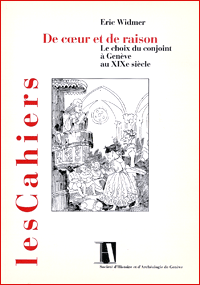Eric D. Widmer
 |
| De coeur et de raison
Le choix du conjoint à Genève au XIXe siècle Mate selection in 19th Geneva Eric Widmer From data gathered from marriage civil records, it was possible to present a comprehensive analysis of mate selection in an urban setting in 19th century Europe, including age, occupation, confession, citizenship, and residence. The second part of the book focuses on parents. It shows how many of them were still alive at the time of the wedding, where they lived, and what part of the dowry came from them, depending on the social class. The thesis that parents were controlling the marriage of their children is hard to accept for most of these 19th marriages. Mates of the artisan class and of the lower working class (which represent 90% of the population) had objectively the conditions to have a more individualistic marriage because of their greater economic independence. Also because they lived away from their parents, and because their parents were often not alive anymore at the time of the marriage. In contrast the "bourgeoisie" parents developed a higher level of control on mate selection thanks to the dowry and because they lived closer and were often still alive at the time of the marriage. In this respect, the younger age at marriage of women of the elites was probably the consequence of parental control strategies. The book ends with a qualitative analysis of a personal diary dating from 1808 which relates the courtship of a minister in Geneva. |  |